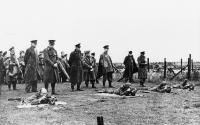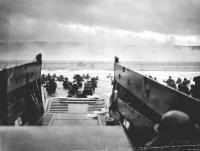Boredom
Published in 20th-century / Contemporary History, Devalera & Fianna Fail, Features, Issue 5 (Sept/Oct 2011), The Emergency, Volume 19
Irish soldiers on the firing range. Service in Allied forces promised some real action, such as the D-Day landings in Normandy. (Tom Kenny)
Apart from increasing military wages, there was little that the Irish government could do to address the main problem facing Irish servicemen: boredom. After the initial surge of recruitment in mid-1940, when Defence Force numbers peaked at around 40,000 men, life in the Irish forces quickly became routine. As the threat of invasion receded after 1941, the army was increasingly deployed on non-military duties, such as helping with the harvest, disposing of animal carcases (after foot-and-mouth outbreaks) and cutting turf. Many Irish servicemen looked enviously at their comrades across the border; service in the British forces promised exotic postings all over the world, using modern and exciting equipment, and—most attractive of all—the chance to see some real action. This, combined with the fact that there were already large numbers of Irish in the British forces, proved too much for many Irish soldiers to resist.

D-Day landings in Normandy.
















